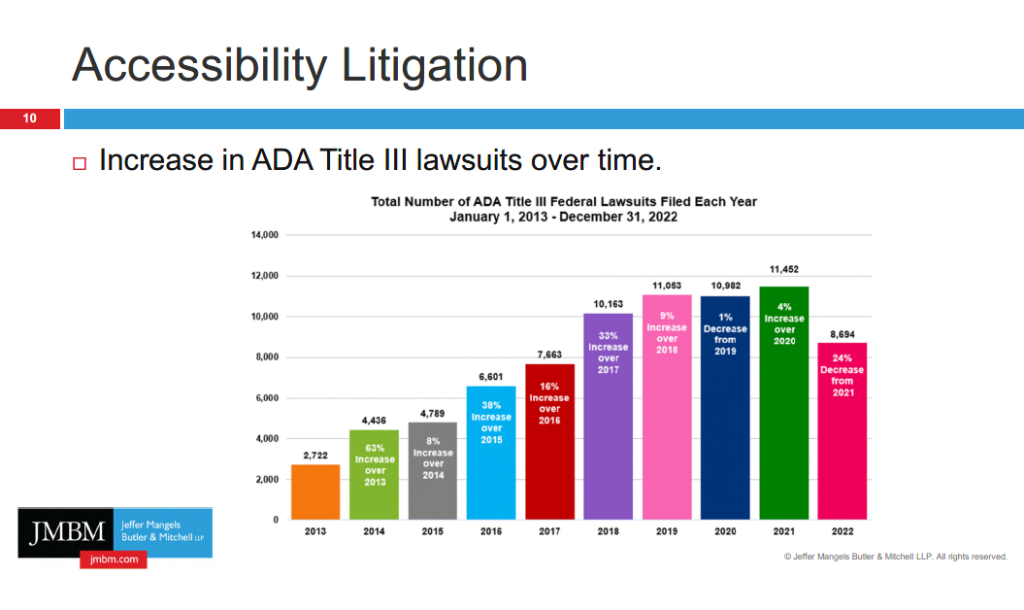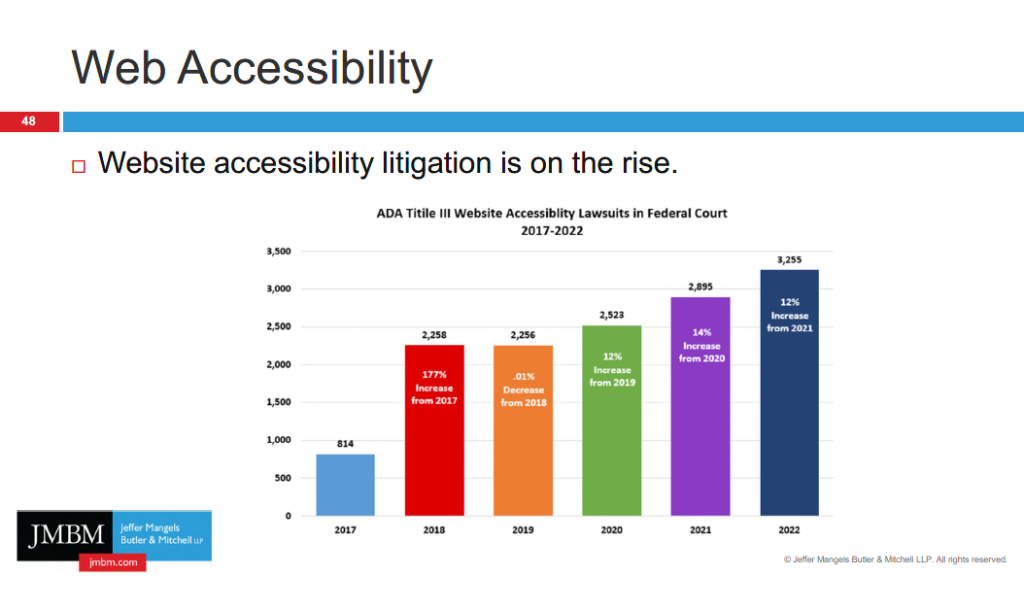11 July 2025
Reprinted with permission from the ADA Compliance and Defense Blog
For small business owners, facing an Americans with Disabilities Act (ADA) lawsuit can feel like an uphill battle. These lawsuits often allege accessibility violations, and the costs of litigation can be daunting, even for businesses striving to comply with ADA regulations. However, a recent victory in the case of Orlando Garcia v. Zarco Hotels Inc. (Case No. 21STCV00023), defended by Stuart Tubis, Esq. and Martin Orlick, Esq., provides a roadmap for defendant businesses to not only fight these lawsuits but also recover significant attorneys’ fees when they prevail. It takes the right facts, the right lawyer and a genuine commitment to fight for what is right.
The Case: Orlando Garcia v. Zarco Hotels Inc.
JMBM previously reported a successful defense against an ADA lawsuit brought by plaintiff Orlando Garcia in which Garcia alleged that the Hollywood Hotel’s reservation requirements failed to comply with the ADA because the website did not provide enough information about the physical accessibility features of the hotel. Defendant Zarco Hotels found the claims meritless and committed to defending the case on the merits. Zarco Hotels prevailed, and the Court ordered Garcia to pay Zarco Hotels $57,604.90 on July 11, 2023.
Garcia appealed this decision, but Zarco Hotels won the appeal, again represented by Stuart Tubis, Esq. and Martin Orlick, Esq. So Zarco Hotels filed a motion to recover the attorneys’ fees it incurred on appeal. On June 20, 2025, the Superior Court of California adopted its tentative ruling as final and awarded Zarco Hotels an additional $84,980.00 in attorneys’ fees incurred defending against Garcia’s frivolous appeal for a total recovery of $142,584.90.
The plaintiff opposed the fee request, arguing that the defendant’s billing records were unreasonable. Despite this opposition, the court found the defendant’s fee request to be justified, highlighting that businesses can recover reasonable attorneys’ fees when they successfully defend against ADA claims that are meritless or frivolous. This recovery can specifically include fees incurred defending an appeal. Garcia is personally responsible for payment to Zarco Hotels.
Key Takeaways for Businesses Facing ADA Lawsuits
The Garcia v. Zarco Hotels case underscores several critical points for businesses navigating ADA litigation:
- Vigorous Defense Can Lead to Victory: The court’s decision to award $142,584 to Zarco Hotels demonstrates that businesses can successfully defend against ADA lawsuits. By presenting a robust defense, businesses may not only defeat the claims but also position themselves to recover litigation costs. While smaller businesses may not opt for a vigorous and prolonged defense, larger businesses or those with a litigation budget should consider this option.
- Recovering Attorneys’ Fees: Under certain circumstances, defendants in ADA lawsuits can seek attorneys’ fees if the plaintiff’s claims are found to be frivolous, unreasonable, or without foundation. The court’s approval of fees, including a detailed breakdown for JMBM’s work, shows that courts are willing to award substantial amounts when the defendant’s legal efforts are justified.
- Challenging Plaintiff’s Billing Arguments: In this case, the plaintiff argued that the defendant’s billing records were unreasonable, citing hours not included in a previous version of the motion. However, the court rejected this argument, suggesting that businesses should meticulously document their legal expenses and be prepared to justify them. Clear, detailed billing records can strengthen a defendant’s position when seeking fee awards.
- Strategic Litigation Matters: The ruling highlights the importance of strategic litigation. Businesses should work with experienced ADA defense attorneys to assess the merits of the plaintiff’s claims early in the process. If the claims lack substance, pursuing a defense that challenges the plaintiff’s case can lead to a favorable outcome, including the possibility of fee recovery.







 Stuart K. Tubis is a partner attorney at Jeffer Mangels Butler & Mitchell LLP and a member of JMBM’s ADA Compliance & Defense Group. Stu counsels businesses and landlords on the full spectrum of ADA compliance issues and represents their interests in litigation and Department of Justice investigations. He has a background in technology, which helps in resolving the growing area of website accessibility issues. Contact Stuart K. Tubis at 415.984.9622 or
Stuart K. Tubis is a partner attorney at Jeffer Mangels Butler & Mitchell LLP and a member of JMBM’s ADA Compliance & Defense Group. Stu counsels businesses and landlords on the full spectrum of ADA compliance issues and represents their interests in litigation and Department of Justice investigations. He has a background in technology, which helps in resolving the growing area of website accessibility issues. Contact Stuart K. Tubis at 415.984.9622 or  This is
This is